Grandma's Recipe for Egg Custard Pie
My Grandma's Old Fashioned Custard Pie is a simple, easy recipe passed down from my grandmother. It features a rich and creamy nutmeg scented custard nestled inside a flaky crust. Our Thanksgiving table wouldn't be complete without it!
This post may contain affiliate links.
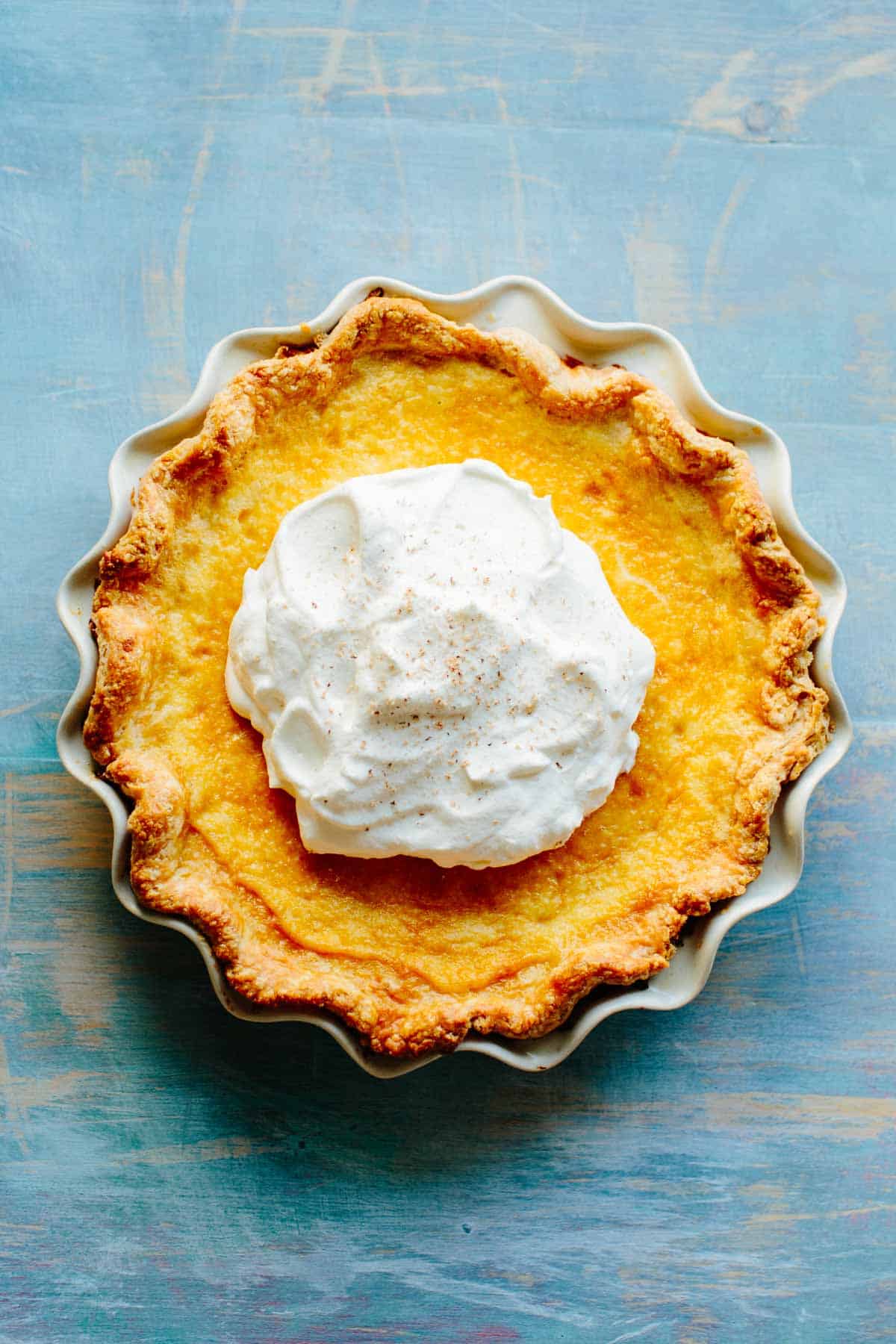
My grandma is famous for her pies: apple pie, blueberry pie and my personal favorite, custard pie. There's something so comforting about the creamy custard filling and the simplicity of the flavors.
But even a simple pie like this requires some key techniques to getting it just right. I’m going to teach you my grandma’s secrets and my professional chef tips for making a custard pie that’s perfectly creamy with an ultra flaky crust.
This recipe starts with the simplest, flakiest homemade crust and a rich, creamy custard filling that’s perfectly sweetened and spiced. Using fresh eggs, milk, and a touch of vanilla, this custard pie is a timeless classic that’s sure to impress.
What is Custard Pie?
Custard pie is a classic single crust pie filled with a rich and creamy egg custard that’s typically seasoned with nutmeg and vanilla. It’s a simple, old fashioned dessert that’s versatile and adaptable.
Why this recipe works
- Rich, creamy and not too sweet.
- Short list of simple, old fashioned ingredients.
- Can be made with a homemade pie crust or store bought.
- Made in advance so you don't have to worry about dessert the day of entertaining.
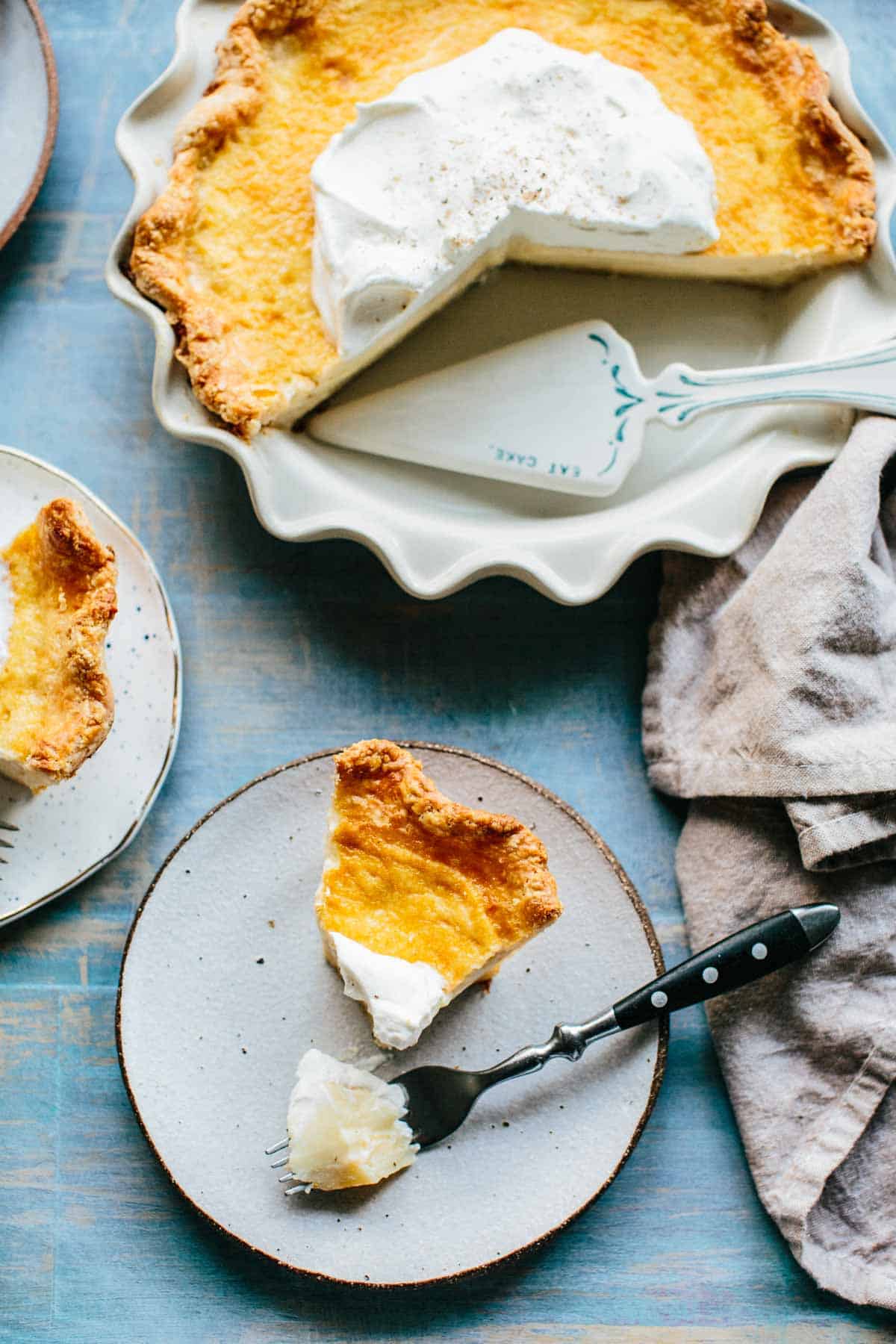
Egg Custard Pie ingredients
- Pie Crust - Grandma's pies taste best because they're always made with her homemade Crisco pie crust. I use my trusty foolproof flaky pie dough recipe, but if you're not up for making it, Trader Joe's sells a pretty good one. Whether store bought or homemade, just make sure you're using a high quality pie crust - it makes all the difference.
- Eggs - For the best tasting custard pie, use the freshest, best quality eggs you can get. Look for the words "pasture raised" in the grocery store - I like this brand.
- Milk and Cream - I find a mixture of whole milk and heavy cream produces the best tasting custard pie with an intensely rich and creamy filling. However, growing up my mom would make custard pie using 100% skim milk and it still tasted really good. Substitute as needed, but stick with real dairy.
- Vanilla Extract - Make sure you use a good quality pure vanilla extract, not imitation vanilla flavoring. The flavors in custard pie are simple, so you will be able to taste the difference.
- Nutmeg - It's very important that your nutmeg is fresh. I prefer to buy whole nutmeg and grate it myself, but if using ground nutmeg, make sure it's less than a year old so it doesn't make your custard pie taste stale or lacking in flavor.
Helpful Equipment
- Pie Plate - An obvious essential for making a custard pie. I love these white ceramic pie plates, but you can't go wrong with a basic Pyrex pie dish either. You can also go with a disposable pan for a potluck if need be.
- Bench Scraper - A bench scraper is essential for scraping the dough off the counter. I use mine all the time when baking.
- Rolling Pin - You can use any cylindrical object to roll out a pie crust (like a wine bottle!), but a decent rolling pin is way easier to work with. I love my French rolling pin because it's lightweight and tapered on the edges to help the dough roll out more evenly.
- Microplane Grater - If grating fresh nutmeg, a Microplane grater will work best.
- Whisk - Use a whisk to mix the custard by hand rather than an electric mixer to avoid air bubbles and over whisking.
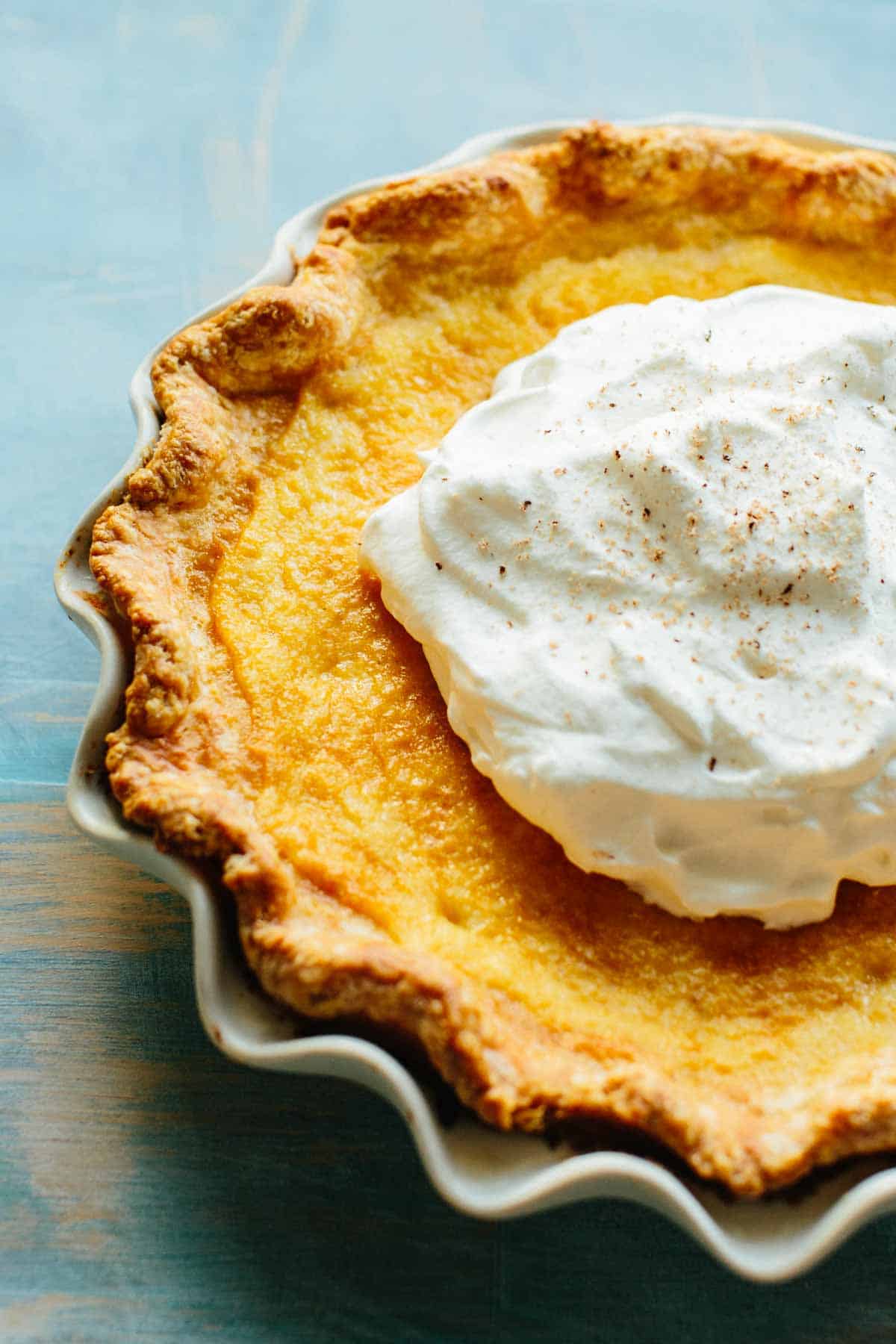
How to make Custard Pie
- Preheat the oven to 425 degrees F.
- Dust a rolling pin with flour and roll out the pie dough so that it's about 3 inches larger than your pie plate. If the dough does not roll out perfectly round, use a knife or a pizza cutter to trim the edges and even it out.
- Gently roll the dough onto the rolling pin and carefully transfer it to the pie plate. Press it in to fit, then tuck the loose pieces under and use your fingers or a fork to crimp the edges. Place in the freezer for at least 15 minutes, or longer if you have time.
- Crack the eggs into a medium bowl. Remove the pie crust from the freezer, then dip a pastry brush into the egg whites and brush the pie crust all over. This will create a barrier so the custard doesn't make the crust soggy.
- Bake the crust for 10 minutes. Keep an eye on it to make sure the edges don't fall down. If they do, push them back up with the back of a spoon while still hot. Let cool.
- Lower the oven temperature to 325 degrees F.
- Add the sugar, salt, vanilla extract, heavy cream, milk and nutmeg to the eggs. Whisk together until very well combined. There should be no visible bits of egg white or yolk remaining, but be careful not to whip too much air into the mixture.
- Place the pie plate on to a foil lined sheet pan to prevent any spills, then pour the mixture into the cooled crust.
- Carefully place the pie into the oven and bake for about 1 hour or until the edges are just set but the filling is still a bit wobbly in the center - if it doesn't jiggle, it's overcooked.
- Allow the pie to cool to room temperature, then place in the refrigerator until ready to serve.
- Top with whipped cream and more grated nutmeg for garnish if desired. Serve chilled.
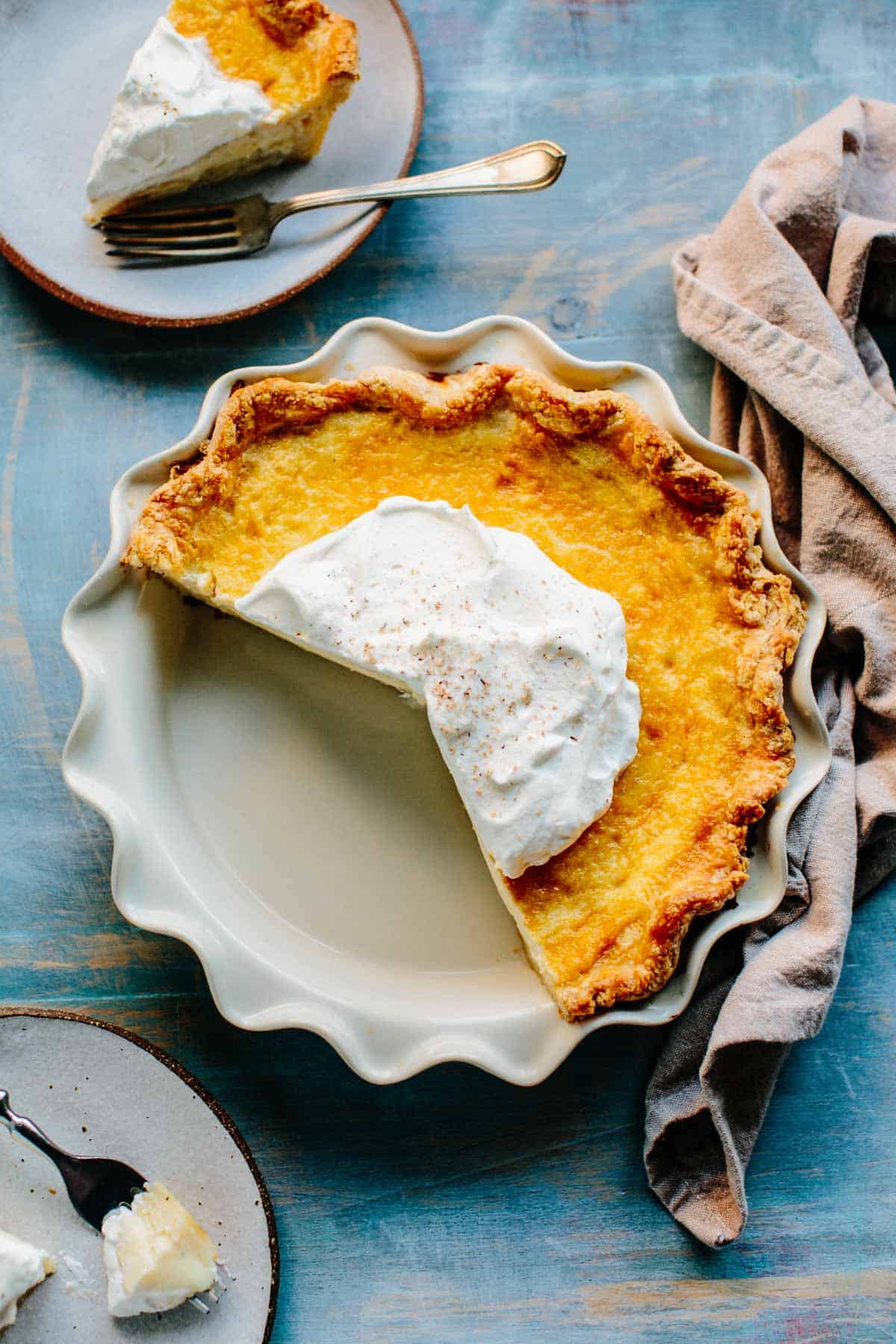
Tips for success
- Keep your raw pie crust in the freezer until you're ready to bake. This will help the pie crust hold its shape while baking and turn out nice and flaky.
- Do not over whisk the custard, as it can add too much air into the mixture which can alter the texture and cause big air bubbles when baking. Avoid using an electric mixer and instead whisk by hand.
- Use caution when transferring the pie to the oven, as the uncooked custard can easily spill out. I like to place the pie plate on a foil-lined sheet pan to catch any potential drips. Also make sure to pour the custard into the crust as close to your oven as possible to minimize the transfer distance.
- For an extra smooth filling, strain the custard before adding it to the pie shell.
- Make sure the pie crust has cooled completely before adding the custard filling to avoid scrambling the egg mixture.
- If the outer crust starts getting too brown before the filling is set around the edges, cover the edges with foil and continue baking until done.
- Be careful not to over bake or it could cause the custard to become rubbery rather than creamy. The edges should be just set with a slightly jiggly center.
- Custard pie needs to be chilled before serving so the custard can set. I like to do it the day before so it can chill overnight, but be sure to give it at least 6-8 hours to ensure it cools properly.
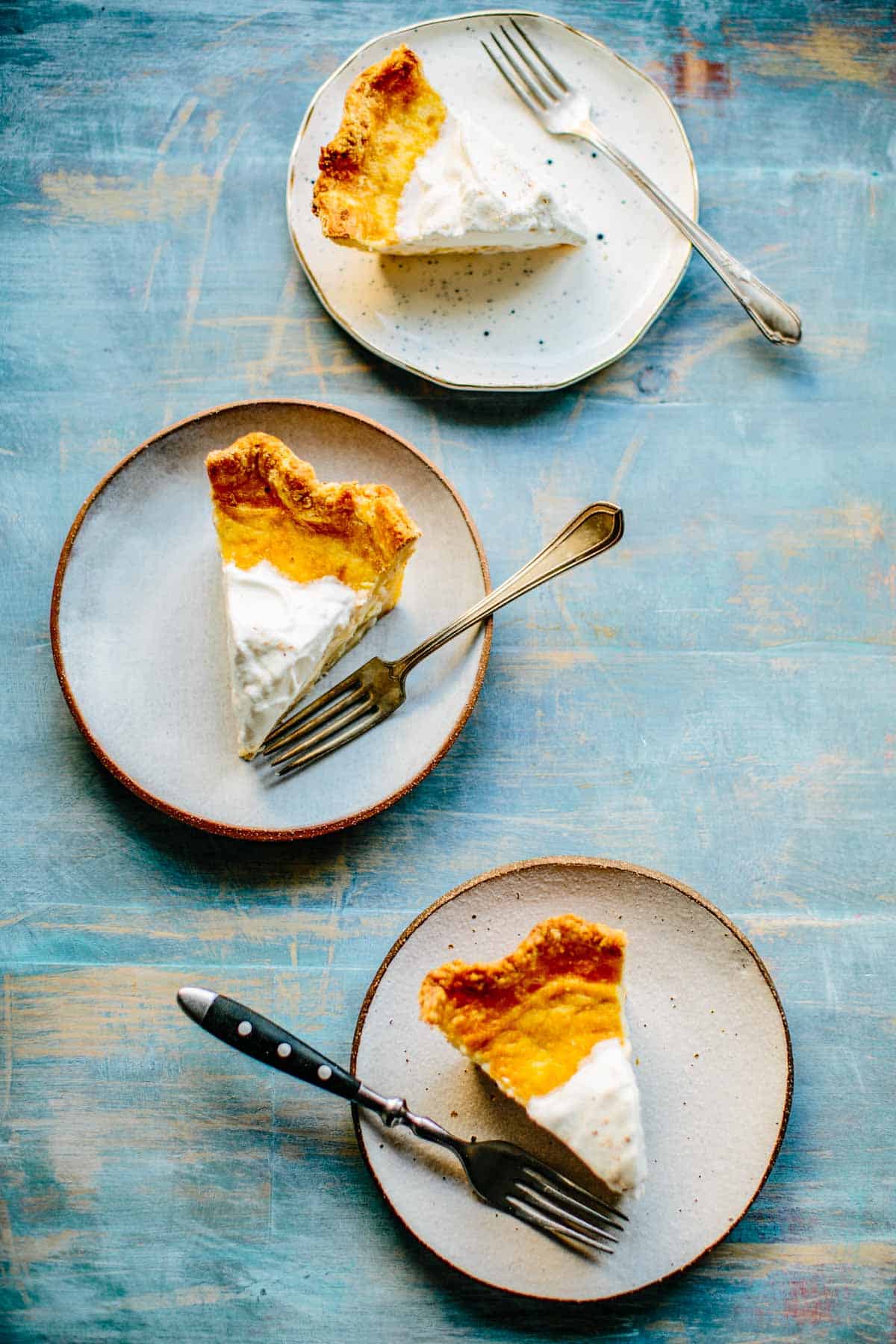
Faq
It may have been over baked, unfortunately. The good news it will still taste great! Just cover it up with a pile of whipped cream if the appearance bothers you.
Yes! You'll know the pie is perfectly cooked when the edges are just set but the center is still a bit loose. It will firm up after chilling. However, if the edges are jiggling, continue baking another 5 minutes and check it again. If the custard is still jiggly after being refrigerated, unfortunately the pie has been under baked.
These are just pieces of egg that have coagulated, either from sitting too long before being baked (the sugar can coagulate the egg) or from adding it to a pie shell that is too hot. To avoid this, mix the custard right before baking, add it to a fully cooled pie shell, and if you're really concerned, strain it through a fine mesh strainer first.
No! This is not something my grandma ever did and is not necessary for a really good custard pie.
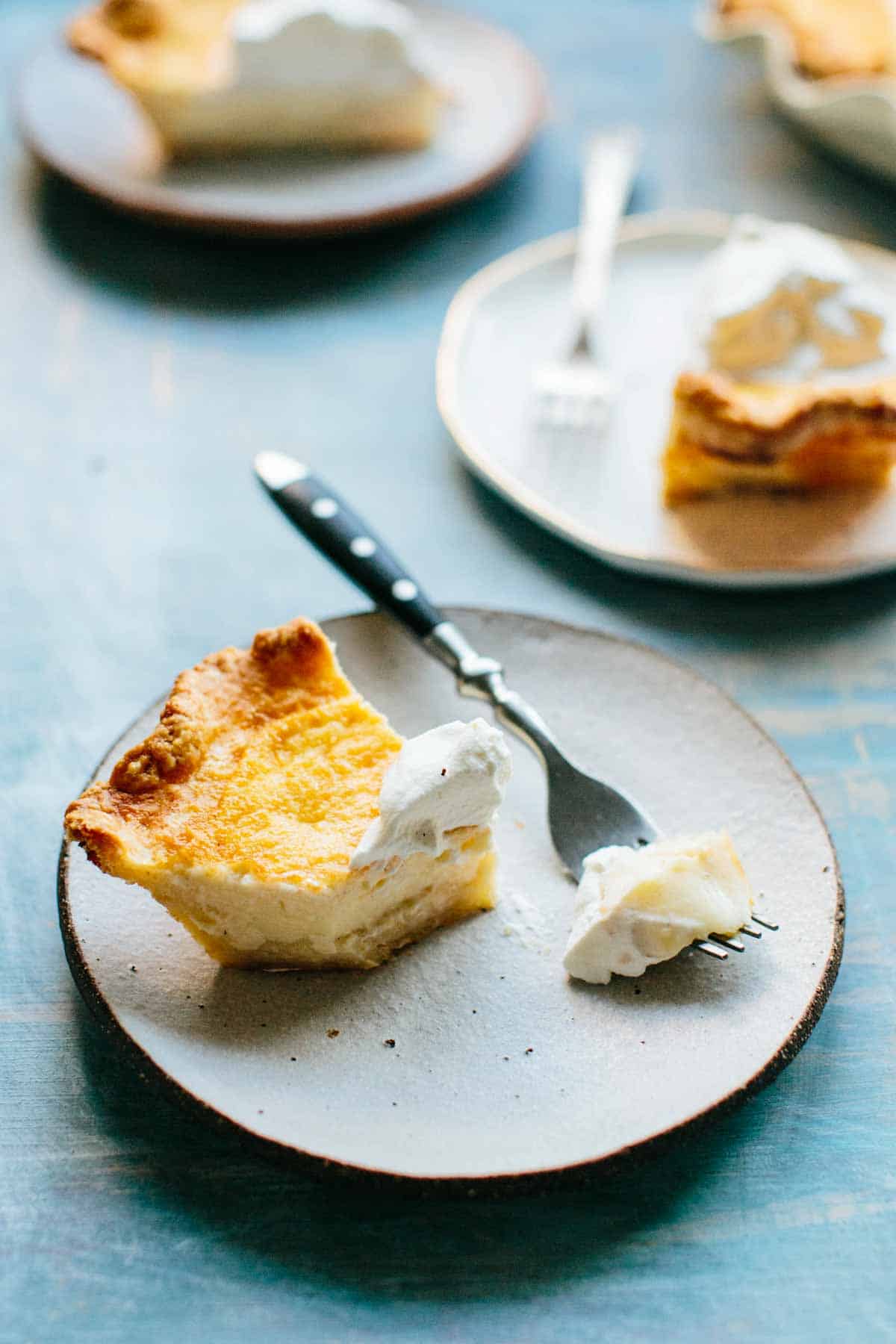
Related Recipes
Did you make this recipe and LOVE it? Please leave a star ⭐️ rating and/or comment to help other readers. I absolutely love hearing from you and do my best to answer all questions and comments. I love seeing when you make my recipes, so please tag me @ColeyCooks on Instagram and I will repost!
Want to Save This Recipe?
Enter your email & I'll send it to your inbox.
By submitting this form, you consent to receive emails from Coley Cooks.
Grandma's Old Fashioned Custard Pie
Ingredients
- 1 disc of Foolproof Flaky Pie Dough or a good quality store bought pie dough
- 4 large eggs
- ½ cup sugar increase to ⅔ for a sweeter pie
- ½ teaspoon salt
- 1 tablespoon vanilla extract
- 1 cup heavy cream
- 1 ½ cups milk
- ¼ teaspoon freshly grated nutmeg
- fresh whipped cream for serving
Instructions
- Preheat the oven to 425 degrees F.
- Dust a rolling pin with flour and roll out the pie dough so that it's about 3 inches larger than your pie plate. If the dough does not roll out perfectly round, use a knife or a pizza cutter to trim the edges and even it out.
- Gently roll the dough onto the rolling pin and carefully transfer it to the pie plate. Press it in to fit, then tuck the loose pieces under and use your fingers or a fork to crimp the edges. Place in the freezer for at least 15 minutes, or longer if you have time.
- Crack the eggs into a medium bowl. Remove the pie crust from the freezer, then dip a pastry brush into the egg whites and brush the pie crust all over. This will create a barrier so the custard doesn't make the crust soggy.
- Bake the crust for 10 minutes. Keep an eye on it to make sure the edges don't fall down. If they do, push them back up with the back of a spoon while still hot. Let cool.
- Lower the oven temperature to 325 degrees F.
- Add the sugar, salt, vanilla extract, heavy cream, milk and nutmeg to the eggs. Whisk together until very well combined. There should be no visible bits of egg white or yolk remaining, but be careful not to whip too much air into the mixture.
- Place the pie plate on to a foil lined sheet pan to prevent any spills, then pour the mixture into the cooled crust.
- Carefully place the pie into the oven and bake for about 1 hour or until the edges are just set but the filling is still a bit wobbly in the center - if it doesn't jiggle, it's overcooked.
- Allow the pie to cool to room temperature, then place in the refrigerator until ready to serve.
- Top with whipped cream and more grated nutmeg for garnish if desired. Serve chilled.
Notes
- Keep your raw pie crust in the freezer until you're ready to bake. This will help the pie crust hold its shape while baking and turn out nice and flaky.
- Do not over whisk the custard, as it can add too much air into the mixture which can alter the texture and cause big air bubbles when baking.
- Use caution when transferring the pie to the oven, as the uncooked custard can easily spill out. I like to place the pie plate on a foil-lined sheet pan to catch any potential drips. Also make sure to pour the custard into the crust as close to your oven as possible to minimize the transfer distance.
- For an extra smooth filling, strain the custard before adding it to the pie shell.
- Make sure the pie crust has cooled completely before adding the custard filling to avoid scrambling the egg mixture.
- If the outer crust starts getting too brown before the filling is set around the edges, cover the edges with foil and continue baking until done.
- Be careful not to over bake or it could cause the custard to become rubbery rather than creamy. The edges should be just set with a slightly jiggly center.
- Custard pie needs to be chilled before serving so the custard can set. I like to do it the day before so it can chill overnight, but be sure to give it at least 6-8 hours to ensure it cools properly.

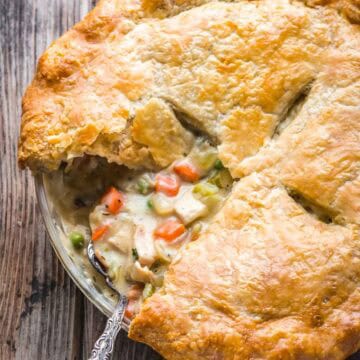
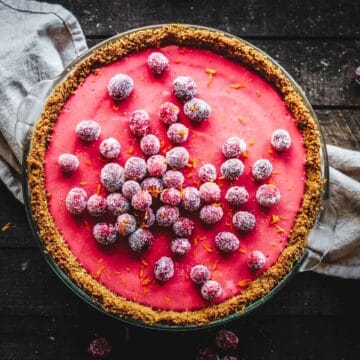
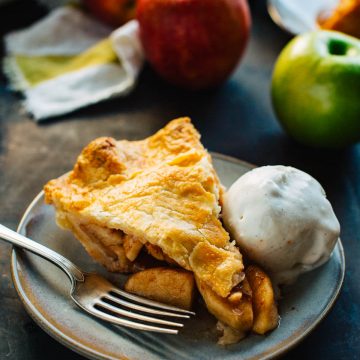
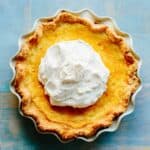

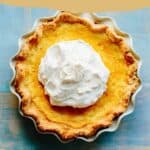


Hi I have a question! It says to crack the eggs and whisk into a bowl, then to brush the whites on the crust. I’m a little confused because the recipe didn’t say anything about separating the egg whites? And are the eggs we mix in the bowl the eggs we use for the actual custard mixture? Thank you so much! I’d love to make this once I get clarification.
Hi! Sorry for the confusion. After cracking the eggs into a bowl, dip your brush in the whites and then brush them to coat the crust. This helps form a seal so the crust doesn't get soggy! These are the same eggs you will use to make the custard and it's totally ok to use the yolk also if you already beat them together. I do it this way rather than cracking a brand new egg, since it doesn't use very much and doesn't affect the custard at all. Hope this helps!
Do you remove pie from baking sheet before baking or once close to oven , take pie off of baking sheet.
I bake the pie right on the baking sheet so that it can catch any spillover. Otherwise it could burn on the bottom of your oven!
Like my Grandma's
That warms my heart! So glad you loved it 🙂
GREAT RECIPE ALMOST THOUGHT IT WAS GRANDMA'S 😀
SO happy you loved it!
I also grew up with custard pie but not many people seem to know about it. It always reminds me of home. Recipe was very good
Aww, I love that! I feel the same way, glad you enjoyed the recipe <3
My grandma also made the best custard pie. I found your recipe looking to replicate hers and I have to say its even better.
That makes me so happy!